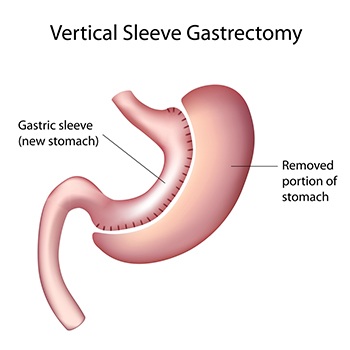 With gastric sleeve weight loss surgery, the stomach is reshaped to create a narrow, tube-like “sleeve,” rather than its original gourd-like shape. This reshaping helps to reduce the size of the stomach and allows you to feel fuller faster. It also changes the amount of food that it is possible for you to eat at any given time because there is little expansion room available to accommodate overeating.
With gastric sleeve weight loss surgery, the stomach is reshaped to create a narrow, tube-like “sleeve,” rather than its original gourd-like shape. This reshaping helps to reduce the size of the stomach and allows you to feel fuller faster. It also changes the amount of food that it is possible for you to eat at any given time because there is little expansion room available to accommodate overeating.
Who is it for?
Gastric sleeve weight loss surgery is no longer considered an investigational or experimental procedure. It is a widely accepted procedure for patients who cannot tolerate other forms of weight loss surgery, such as lap banding, stomach stapling or gastric bypass. Typically, these patients have health conditions that would make the other procedures more dangerous, or are too morbidly obese to tolerate the surgery. Gastric sleeve weight loss surgery is easier to tolerate because it is done laproscopically through small incisions.
Special Considerations
Many doctors will require that a patient enter therapy or a weight management clinic before being considered for the surgery. A common requirement is that the patient takes off 10 to 20-percent of the weight themselves through diet and exercise before the surgery will be scheduled. There are two reasons for these special considerations. The first is that weight loss from the gastric sleeve procedure is much slower than with other procedures, yet the diet is more restrictive. This can cause a great deal of emotional stress. The second consideration is that without being able to maintain the proper diet, the weight will return but not usually before causing complications for you.
The other consideration that is different for all is whether insurance will cover it. Each person is different and not all insurance plans will even consider paying for the procedure.
What to expect with Gastric Sleeve Weight Loss Surgery
Gastric sleeve weight loss surgery is an inpatient procedure and takes about an hour to perform. The average stay in the hospital after the surgery is two to three days and it can take about six weeks after that before you are considered fully recovered. While you are recovering you will have to take great care with how you move so as not to strain or herniate yourself in the area that had the surgery. You will also have to play strict attention to what you are eating. Most people follow a very strict liquid diet to keep their nutrition up but avoid putting solid foods into their stomach until it heals. After your stomach has healed, the diet can be very restrictive in amounts and types as well to promote weight loss. Following doctor’s orders is a must!
The Risks of Gastric Sleeve Weight Loss Surgery
While the gastric sleeve is considered by doctors to be a safe procedure, no invasive procedure is 100% safe. There are risks involved with gastric sleeve weight loss surgery that can occur during the surgery, and after. The main risks while in surgery include:
- Infection
- Perforation of stomach or intestines
- Adverse reaction to Anesthesia
- Bleeding
- Cardiac Arrest
- Blood Clot
- Pulmonary Issues
After you have had the surgery performed there are several other possible risks. Some of them can develop into life threatening conditions.
- Surgery related complications post surgery
- Liver and Kidney failure
- Stroke
- Hypertension
- Hepatitis
- Depression
- Social anxiety disorders
- Eating disorders
Talk to your doctor about any increased risk they perceive for you. Family history, current support systems and overall health will play a huge role in determining the risk level and deciding what are the best steps to take to keep you safe.
Keeping the Weight Off after Gastric Sleeve Weight Loss Surgery
Unfortunately, many people gain the weight they lost back within the first two years following gastric sleeve weight loss surgery. The problem does not lie in the gastric sleeve being ineffective, but in the aftercare planning for continuing the weight loss. No weight loss surgery is going to change your dietary or wellness habits that contributed to the weight gain in the first place. Unless you commit to a serious program of transforming your relationship with food, exercise habits and self-care habits you can easily gain back everything. One thing that will help is to follow the dietary restrictions you will be discharged with after the gastric sleeve weight loss surgery. Then immediately start to keep a food journal in which you track your diet, lifestyle habits and weight change. By getting in the habit of taking charge of your life, you can get the weight off and keep it off.

Comment Via Facebook